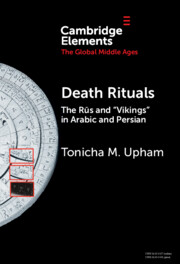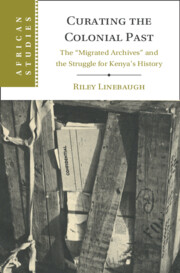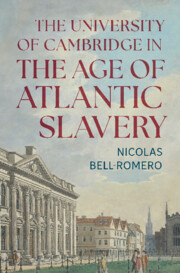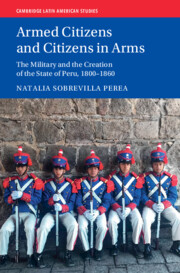Refine search
Actions for selected content:
615972 results in History
Life As a Soap Opera: Imaginaries of Romance and Social Prestige among Young Brides in Turkey
-
- Journal:
- International Journal of Middle East Studies , First View
- Published online by Cambridge University Press:
- 15 September 2025, pp. 1-24
-
- Article
-
- You have access
- Open access
- HTML
- Export citation
Markéta Kulhánková and Przemysław Marciniak (eds), Byzantium in the Popular Imagination: The Modern Reception of the Byzantine Empire. London: I.B. Tauris, 2023. Pp. xi, 278.
-
- Journal:
- Byzantine and Modern Greek Studies / Volume 49 / Issue 2 / October 2025
- Published online by Cambridge University Press:
- 15 September 2025, pp. 313-314
- Print publication:
- October 2025
-
- Article
- Export citation
ISH volume 70 issue 1 Cover and Front matter
-
- Journal:
- International Review of Social History / Volume 70 / Issue 1 / April 2025
- Published online by Cambridge University Press:
- 15 September 2025, pp. f1-f5
-
- Article
-
- You have access
- Export citation
SAND, SHLOMO. A Brief Global History of the Left. Polity Press, Cambridge [etc.] 2024. 264 pp. € 20.40. (E-book: € 15.99.) – ERRATUM
-
- Journal:
- International Review of Social History / Volume 70 / Issue 1 / April 2025
- Published online by Cambridge University Press:
- 15 September 2025, p. 209
-
- Article
-
- You have access
- HTML
- Export citation
The politics of pity in Italian views of defeated Germany
-
- Journal:
- Modern Italy , First View
- Published online by Cambridge University Press:
- 15 September 2025, pp. 1-18
-
- Article
-
- You have access
- Open access
- HTML
- Export citation
Gender and Party Polarization in the US Congress: Hypervisibility and Invisibility
-
- Journal:
- Journal of Policy History / Volume 37 / Issue 4 / October 2025
- Published online by Cambridge University Press:
- 15 September 2025, pp. 284-302
-
- Article
-
- You have access
- Open access
- HTML
- Export citation
La valle del vino. Un secolo di presenza italiana in California (1850–1950)by Pietro Pinna, Rome, Viella, 2023, 335 pp., €30 (paperback), ISBN 9791254693674
-
- Journal:
- Modern Italy , First View
- Published online by Cambridge University Press:
- 15 September 2025, pp. 1-3
-
- Article
- Export citation

Leadership in the Ancient World
- Concepts, Models, Theories
-
- Published online:
- 14 September 2025
- Print publication:
- 16 October 2025
The ghostwriter and the test-tube baby: a medical breakthrough story
-
- Journal:
- Medical History , First View
- Published online by Cambridge University Press:
- 14 September 2025, pp. 1-24
-
- Article
-
- You have access
- Open access
- HTML
- Export citation

Death Rituals
- The Rūs and 'Vikings' in Arabic and Persian
-
- Published online:
- 13 September 2025
- Print publication:
- 09 October 2025
-
- Element
- Export citation

Curating the Colonial Past
- The ‘Migrated Archives' and the Struggle for Kenya's History
-
- Published online:
- 12 September 2025
- Print publication:
- 02 October 2025

The University of Cambridge in the Age of Atlantic Slavery
-
- Published online:
- 12 September 2025
- Print publication:
- 30 October 2025
-
- Book
-
- You have access
- Open access
- Export citation

Armed Citizens and Citizens in Arms
- The Military and the Creation of the State of Peru, 1800‒1860
-
- Published online:
- 12 September 2025
- Print publication:
- 25 September 2025

Palestinian Doctors
- Medical Practice and the Transformation of Palestine, 1900–1948
-
- Published online:
- 12 September 2025
- Print publication:
- 02 October 2025
Transnational Whiteness and the Elite Backlash to Reforming the Australian Immigration Control System in the 1950s and 1960s
-
- Journal:
- The Historical Journal , First View
- Published online by Cambridge University Press:
- 12 September 2025, pp. 1-20
-
- Article
-
- You have access
- Open access
- HTML
- Export citation
Entrepreneurship capital in Spain and its impact on modern economic growth (1886–2000)
-
- Journal:
- Revista de Historia Economica - Journal of Iberian and Latin American Economic History , First View
- Published online by Cambridge University Press:
- 12 September 2025, pp. 1-26
-
- Article
-
- You have access
- Open access
- HTML
- Export citation
Argentina’s creditworthiness achievements and problems, 1955–1962: the role of institutions, policymakers, and external agents
-
- Journal:
- Revista de Historia Economica - Journal of Iberian and Latin American Economic History , First View
- Published online by Cambridge University Press:
- 12 September 2025, pp. 1-21
-
- Article
- Export citation
Jessica Ratcliff, Monopolizing Knowledge: The East India Company and Britain’s Second Scientific Revolution Cambridge: Cambridge University Press, 2024. Pp. 306. ISBN 978-1-009-37949-6. £90.00 (hardback).
-
- Journal:
- The British Journal for the History of Science , First View
- Published online by Cambridge University Press:
- 12 September 2025, pp. 1-2
-
- Article
-
- You have access
- HTML
- Export citation
Outposts in the Wilderness: Post-Evangelical Feminist Communities on Digital Media, 2004–2024
-
- Journal:
- Religion and American Culture , FirstView
- Published online by Cambridge University Press:
- 12 September 2025, pp. 1-33
-
- Article
- Export citation
Alma Steingart, Axiomatics: Mathematical Thought and High Modernism Chicago: University of Chicago Press, 2023. Pp. 300. ISBN 978-0-226-82420-8. $35.00 (paperback).
-
- Journal:
- The British Journal for the History of Science , First View
- Published online by Cambridge University Press:
- 12 September 2025, pp. 1-2
-
- Article
-
- You have access
- HTML
- Export citation
